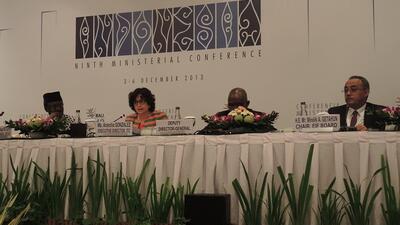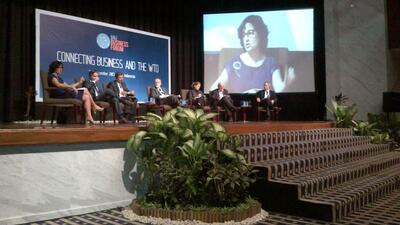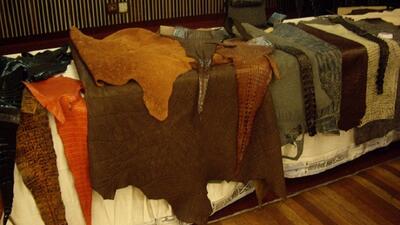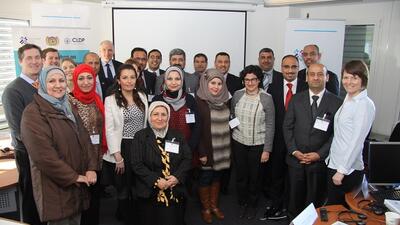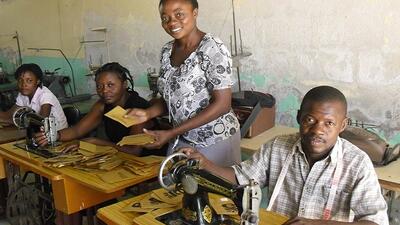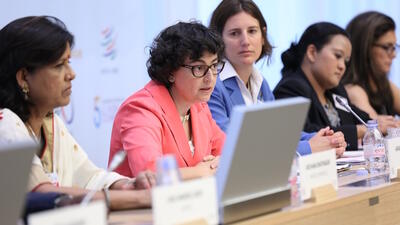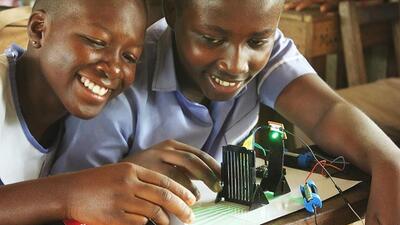
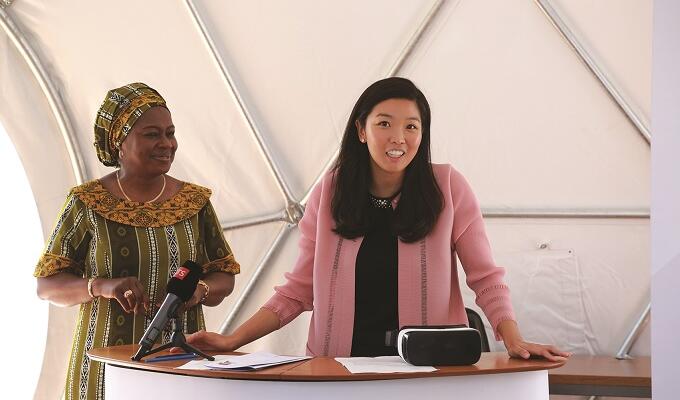
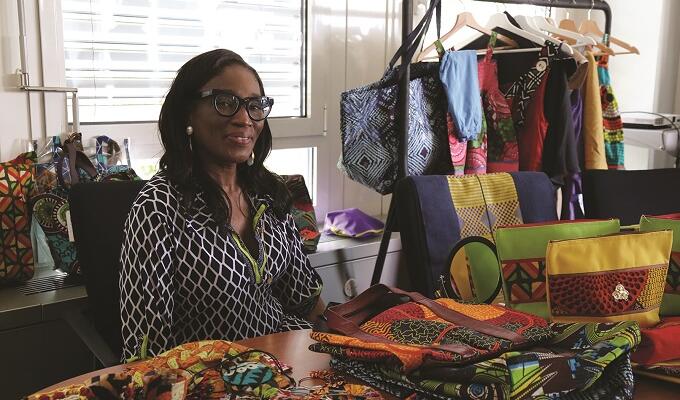
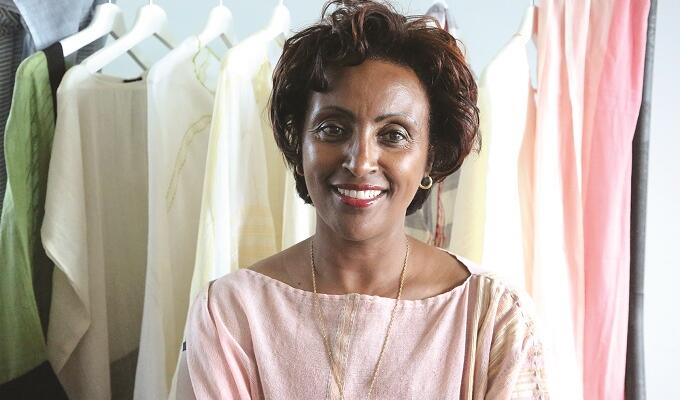
A digital caravan for better and more e-commerce
in developing countries overcome digital barriers
In July 2016, the International Trade Centre (ITC) in partnership with DHL, a logistics company, and eBay, an online retailed, organized The Swiss Summer Route, an ‘e-commerce caravan’ that travelled from Geneva to Zurich. The caravan, in the form of a pop-up store, helped shine the spotlight on e-commerce, which for producers in developing countries can still be a huge barrier to exports.
Companies that ITC works with in Cote d’Ivoire, Ethiopia, Morocco, Rwanda, Senegal and Syria were invited to join the caravan to showcase and sell their products as part of an initiative that also set out to convince quality-conscious buyers in Europe that quality product are also made in developing countries.
International Trade Forum used the opportunity to catch up with some of the vendors to hear what challenges they face and they are overcoming them.
MOROCCOEl Amine Serhani has the difficult job of juggling the numerous demands of his customers and managing the wide range of products sold by Made in Morocco.
The cooperative employs e-skilled producers of goods such as argan oil, beauty products, fresh fish, high-end jewellery and lamps.
‘E-commerce has given me economic stability,’ El Amine says. ‘I earn my living through it and can provide for my family.’
Still, it has not been an easy road for the group of small and medium-sized enterprises (SMEs). The lack of costeffective transportation and international payment solutions served as roadblocks to progress. Tax issues still inhibit many of the producers.
ITC has supported the Made in Morocco platform by providing links to payment and logistics solutions. It has also provided financial support for transportation and trained the businesses on marketing for European customers, specifically by promoting the concept of an e-caravan. ‘The caravan is a very powerful vehicle to bring a wide range of our products to the European market,’ El Amine says.
Selling products as a cooperative makes for a smoother transaction of profits between businesses and customers. It allows SMEs greater autonomy in creating a marketplace with a varied range of specialized products, El Amine explains.
For instance, the Made in Morocco platform offers a wide variety of beauty and skin care products made from argan oil. The range of choice attracts a diverse range of customers and ensures higher sales. There are no intermediaries to swallow up profits.
With an average of 267 products sold a day, Made in Morocco’s journey to the European market can be flagged as a success. E-commerce will allow the producers to retain their European customers and look towards newer horizons. In the near future, the cooperative hopes to expand its markets to Asia and North America, to showcase the diverse goods Morocco has to offer.
COTE D’IVOIRESonia Seyo loves the diversity of the pagne – a colourful women’s garment – she uses to create products for Collection d’Afrik. She believes it helps her sell more products and she has full confidence in the quality of her goods. Collection d’Afrik is a group of four SMEs creating high-end home decoration, fashion apparel and accessories. The affordable prices and wide range of patterns and colours help attract customers to their online collection.
The strength of Collection d’Afrik lies in its understanding of the materials available in Cote d’Ivoire. Instead of relying on fabrics from Europe or the rest of Africa, the cooperative makes full use of the vast variety of pagne available in Cote d’Ivoire. It also offers employment to marginalized members of society, who are afforded the opportunity to provide for their families. But establishing a customer base is difficult from an online store, as people are unable to touch the products and ascertain the worth of the fabric. Transport costs and border control also hinder exports.
The development of Ivorymall, an online marketplace for Ivorian design companies, by ITC has greatly aided these Cote d’Ivoire producers. The initiative is a fully e-commerce enabled marketplace which allows businesses to access Visa, MasterCard and Paypal payment options as well as store their goods in Europe for cheaper and quicker transport. The e-commerce caravan has also helped make the brand more visible.
‘My caravan experience will make it easier to trade online,’ Seyo says. ‘People are now interested and aware of my products and their quality.’
Seyo encourages all SMEs to educate people on their specialized products and resources.
‘I think it is very useful to set up panels and interact with customers personally so that they understand and want to buy your products,’ Seyo says.
With a firmer grasp on the European market, Seyo plans to grow her business and share her love for pagne with markets in North America next. Expanding her business will contribute significantly to reducing the unemployment levels in Cote d’Ivoire, she says, empowering people through trade.
RWANDAAnna Kim is CEO of LetSequoia, a smallholder coffee producer of fine Arabica coffee in Rwanda. Together with her business partner, Mama Louise, Kim employs 30 workers to farm and wash the coffee beans.
The majority of coffee production sites in Rwanda are owned and run by large, international coffee brands which export and outsource value-adding activities such as roasting and packing to other markets.
For Rwandan smallholders who grow, clean and prepare the coffee, less than 5% of the retail value of the coffee is retained and often the cost of logistics is higher than the price of coffee per kilogram.
ITC has worked with smallholder coffee growers like LetSequoia to set up ‘direct coffee’ channels that work like integrated supply chains. This has helped smallholder coffee producers in Rwanda to step up export efforts to better compete with large producers. Kim, originally from Korea, started working with ITC’s E-Solutions Programme in 2015 with a goal to meet new buyers and boost exports.
‘Because we are based in Rwanda we are dependent on buyers to come to us or to already know about our business,’ she says. ‘It is also logistically difficult and expensive for us to export. Each carton is about US$ 2,500 with a volume of at least 320 bags, which is about 20 tonnes of coffee.’
ITC’s E-solutions Programme provides advisory and capacity building services to support small and medium-sized enterprises in developing countries through digital platforms.
Through the caravan and the E-Solutions Programme Kim sees more opportunities to expand the business further.
‘Being part of the caravan is very exciting,’ she says. ‘It is a great opportunity to both meet new clients and see how we can expand our business globally through e-commerce.’
Kim also explains that e-commerce will help remove some of the dependency that they and other smallholders currently have on local buyers and local exports. She hopes that ITC’s E-Solutions Programme Kim, could potentially lead to LetSequoia opening an international office in either Togo or Cameroon.
ETHIOPIAMerging the traditional with the modern – that’s the idea behind Ethiopian fashion designer Genet Kebede’s company, Paradise Fashion.
Kebede founded her brand in 1992 after studying fashion design and garment construction in Italy and Argentina. She creates contemporary Ethiopian fashion and bridal items for women around the world, weaving traditional local cloth and fabrics with modern techniques and trends.
Kebede began working with ITC E-Commerce Programme in 2015 with the aim of expanding her business. She wants to introduce Ethiopian designs to international markets while at the same time help more women at home.
Kebede emphasizes the sustainability impact e-commerce could have for women weavers and their families in Ethiopia.
‘Each of our products is handmade and has a unique story behind it,’ Kebede says. ‘Therefore this e-commerce caravan comes with a sustainability aspect. It guarantees that you sell your products directly to the consumer without any intermediates in between. Therefore you sell your products at a better price and you can give more to each family behind the products.’
Kebede first partnered with ITC’s Women and Trade Programme in 2013 when she participated in a textiles and garments buyer mentor group in London. Through ITC she has met international buyers and designers, participated in local and international workshops and trade shows, and received mentoring and capacity building training.
‘I have benefitted from working with ITC in many different ways and its staff has helped me to strengthen myself and my company in so many ways,’ Kebede says. ‘The trade shows have allowed me to meet buyers and really understand what the market wants. Through webinar workshops I have learned how to negotiate effectively with my clients and how to better present and promote my products.’





